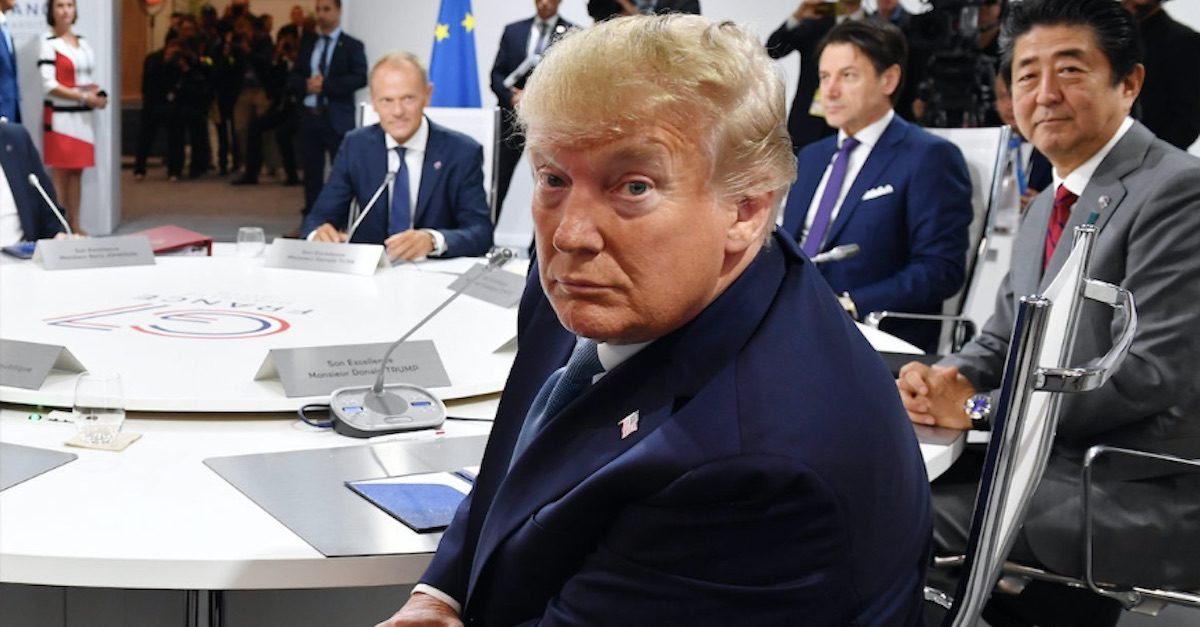
President Donald Trump inserted himself directly into Friday’s public impeachment hearing, attacking former U.S. ambassador to Ukraine Marie Yovanovitch on Twitter during her live televised testimony before congressional investigators. The series of ill-advised tweets shocked legal experts, many of whom pointed out that the president’s statements constituted witness tampering and would likely be added to the eventual Articles of Impeachment.
“Everywhere Marie Yovanovitch went turned bad. She started off in Somalia, how did that go? Then fast forward to Ukraine, where the new Ukrainian President spoke unfavorably about her in my second phone call with him,” Trump tweeted about an hour into Yovanovitch’s testimony. “It is a U.S. President’s absolute right to appoint ambassadors … ‘They call it ‘serving at the pleasure of the President.'”
“The U.S. now has a very strong and powerful foreign policy, much different than proceeding administrations. It is called, quite simply, America First! With all of that, however, I have done FAR more for Ukraine than O,” he added.
Former federal prosecutor and current CNN legal analyst Elie Honig said Trump’s tweets, which were directed at a witness as she gave testimony unfavorable to the president, constituted “textbook” witness intimidation.
“I’ve prosecuted witness tampering cases. I’ve tried witness tampering cases. To me this is right down the middle,” Honig said.
A few minutes later, Honig explained why the timing of Trump’s tweet was particularly significant to such a claim.
“You have to look at what’s his intent. When is he doing this? – he’s doing this in the middle of her testimony. And are the attacks just substantive or are they personally directed at her? So it all comes down to intent. To me, the timing – how can you ignore the timing – it’s while this is happening,” he reiterated.
Honig also noted the president’s history of taking similar actions against witnesses whose testimony he found unfavorable.
“And also, he has a track record of doing this. Mueller called him out for doing this towards Manafort, Cohen, everyone else who might potentially testify, so it’s not like this is his first time at the gate, I think he has an established pattern,” he said.
Fox News guest and former Whitewater independent counsel Ken Starr similarly said Trump’s tweet showed “extraordinarily poor judgement.”
“I must say the president was not advised by counsel in deciding to do this tweet. Extraordinarily poor judgement,” Starr said to host Bill Hemmer. “The president frequently says, ‘I follow my instincts.’ Sometimes we have to control our instincts, so obviously I think this is quite injurious.”
Daily Trump critic Harvard Law professor Laurence Tribe also weighed in on Trump’s tweets, noting that his conduct will likely find its way to the House’s Articles of Impeachment.
“This Trump tweet is criminal witness intimidation. Glad [Rep. Adam Schiff] called it out in real time. This vicious attack on a witness during her testimony may chill weaker souls, but he won’t get away with it. It’ll be part of an Article of Impeachment for obstructing Congress,” Tribe tweeted.
Libertarian Rep. Justin Amash, who recently left the Republican party after openly calling for Trump’s impeachment, concurred, writing, “Expect witness tampering to be an article of impeachment.”
As all of this discussion about witness tampering was ongoing, longtime Trump ally and adviser Roger Stone was found guilty of all charges against him, including a witness tampering charge. Prosecutors alleged that Stone lied to protect Trump. Legal observers were quick to note a) the “symmetry” of it and b) that federal prosecutors take such crimes “very seriously.”
[image via Jeff J Mitchell – Pool /Getty Images]